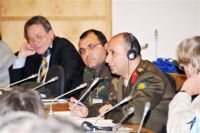GARMISCH-PARTENKIRCHEN, Germany, Jan. 20, 2012 — The potential rippling effects on regions caused by revolutions in North Africa and the Middle East lead discussions here at a Department of Defense-sponsored conference held at the George C. Marshall European Center for Security Studies.
“Arab revolutionary transformation — Quo vadis?” unites two of the DOD’s regional centers — the George C. Marshall European and Near East South Asia Centers for Security Studies — as the theme of the Jan. 18–26 Senior Executive Seminar 12–1. Both regional centers belong to the Defense Security Cooperation Agency. Ninety seven participants from 47 countries covering three combatant commands — the U.S. Africa, Central and European Commands — are working to better-define what’s occurring in countries like Egypt, Libya, Tunisia, Syria and other nations. Speakers include academics, military leaders and others involved with the change process in those nations.
Retired Army Lt. Gen. Keith W. Dayton, Marshall Center director, said what comes from these discussions will be delivered to combatant commanders and other clients for further use in regional planning and policy decisions.
“The topic — ‘Arab Spring’ and how we deal with it — is really important, not only to Eucom, Africom and Centcom,” Dayton said, “but it’s also important to people who live in Eurasia, North Africa, the Middle East and Europe.”
The ‘Arab Spring’ began December 2010. There have been revolutions in Tunisia and Egypt; a civil war in Libya, resulting in the fall of its government; civil uprisings in Bahrain, Syria, and Yemen — the latter resulting in the resignation of the Yemeni prime minister; major protests in Algeria, Iraq, Jordan, Kuwait, Morocco, and Oman; and minor protests in Lebanon, Mauritania, Saudi Arabia, Sudan, and Western Sahara.
Well aware of the seminar’s implications, Navy Adm. James G. Stavridis, Supreme Allied Commander Europe, addressed the participants via recorded welcome, calling the seminar an “extremely important event.”
“This seminar brings together an extraordinary range of viewpoints,” the admiral said. “So, how do we collectively understand and react to this type of fundamental change? Bringing all of you together will afford the opportunity to step back … and chart a course forward.”
Among the nations represented for the event, Bahrain, Kuwait, Niger and the United Arab Emirates are first-time attendees. In forging bonds here, they will become part of the two regional centers’ 13,000-strong network of alumni.
Panel discussions and lectures are confidential, center officials said, to help participants open up about what they perceive are the challenges in their countries and regions. Retired French Maj. Gen. Philippe Sommaire, seminar director for the Marshall Center, said that strategy has paid off.
“We’ve been getting almost exactly what we want in frank discussions between guest speakers and participants,” he said. “It’s going very well.”
Magda Kandil provided an Egyptian perspective on events as a guest speaker on Jan. 19. Kandil, executive director and director of research of the Egyptian Center for Economic Studies, said the seminar shines the spotlight on unprecedented democratic transformation.
“It brings the issues closer to the participants here,” she said. “It’s very important to give them first-hand information about what is going on in these countries. We want the international community to realize how difficult the process of transformation has been.”
Seminar topics touch upon different aspects of the defense department, officials said, including the National Guard Bureau. Army Brig. Gen. Kevin McNeely is a seminar participant who also runs the Pentagon’s State Partnership Program. The program reaches 63 countries in Europe and Africa, including Egypt, Jordan, Morocco, and Tunisia.
“The foundation of the program is ensuring relationships. Getting a better understanding of the challenges that are being faced by the governments and the militaries of these countries is important to our partnership with them,” McNeely said.
Dayton said there’s no limit to what can be accomplished during the seminar.
“What we want to do at the end of the day,” Dayton said, “is not only get a better understanding by talking to people at a senior level who come from these countries, but we also want policy recommendations that go back to the respective countries involved so that they can better deal with the phenomenon that is probably going to be with us for some time.”
Source:
U.S. Department of Defense
Office of the Assistant Secretary of Defense (Public Affairs)

 von
von 